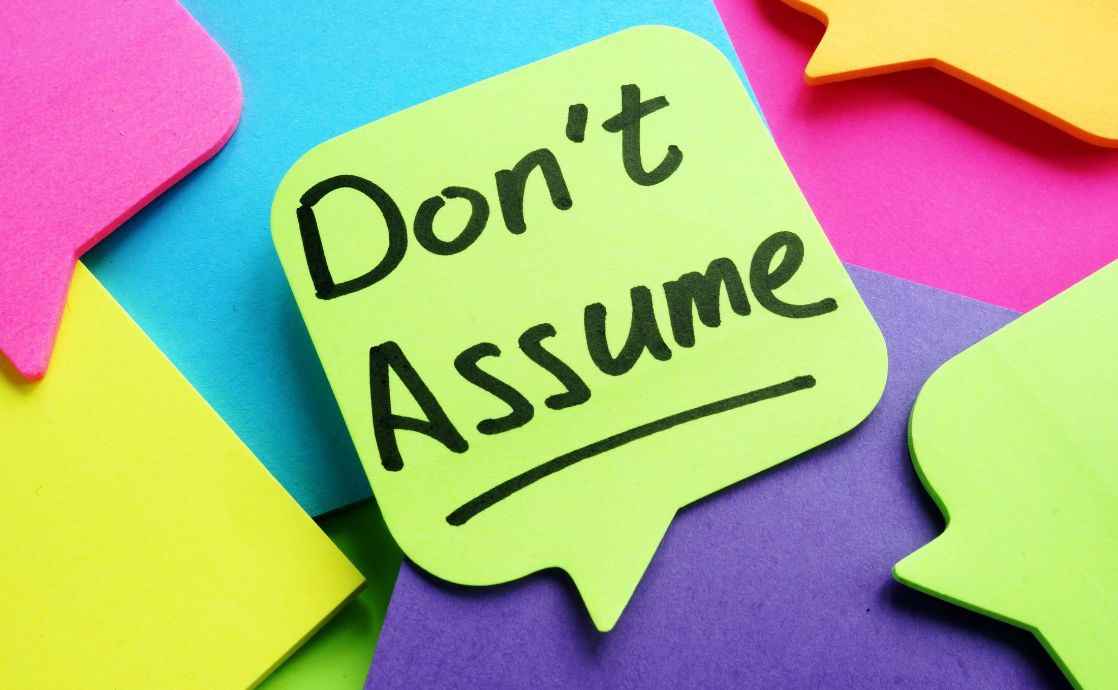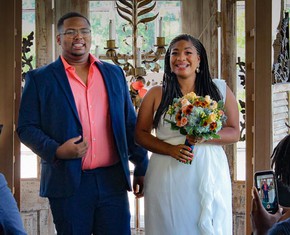The views expressed in our content reflect individual perspectives and do not represent the authoritative views of the Baha'i Faith.
A mother thought her daughter was mad at her because she didn’t answer her phone calls one day. A teen thought her friends didn’t care about her because they didn’t send her any get-well-soon messages when she was sick. A friend was perceived as sarcastic and insincere due to the natural tone of her voice.
All of the above assumptions resulted in misunderstandings and hurt feelings because each person’s judgments weren’t even true.
Examples of Common Assumptions That People Make
Unfortunately, people make assumptions all the time when they:
- Assume that others know what they want even if they don’t verbalize it.
- Assume that others think, behave, and communicate in the same way that they do.
- Assume they know the intentions behind someone’s actions without clear communication or evidence.
- Assume that the behaviors of others are a reflection of their feelings towards them.
- Assume that others agree with their beliefs, opinions, or perspectives without verifying.
- Assume that others’ behaviors are a result of their personality traits rather than considering external factors.
- Assume that individuals in a demographic share the same characteristics or behaviors.
This list can go on and on.
Why You Should Not Make Assumptions
So much preventable interpersonal conflict is based on faulty guesses. As don Miguel Ruiz explained in his book, “The Four Agreements,” “We make assumptions about what others are doing or thinking — we take it personally — then we blame them and react by sending emotional poison with our word. That is why whenever we make assumptions, we’re asking for problems. We make an assumption, we misunderstand, we take it personally, and we end up creating a whole big drama for nothing.”
RELATED: Don’t Take Anything Personally: 5 Tips for the Second Agreement
That is why “don’t make assumptions” is the third agreement that don Miguel Ruiz asks us to make in order to experience more happiness and harmony in our lives.
6 Tips on How to Stop Making Assumptions and Avoid Misunderstandings
Based on guidance from the Baha’i writings and inspiration from “The Four Agreements,” here are six tips that I have identified that can help us stop making assumptions and avoid misunderstandings:
1. Avoid Jumping to the Worst Case Scenario
Is your colleague not responding to your emails because they don’t like you, or is it because they are swamped with work and having trouble finding the time to respond to all their messages? It’s important to consider the many reasons a person might behave a certain way before jumping to the worst-case scenario.
RELATED: Spiritually and Psychologically Overcoming the Negativity Bias
Before you change your opinion of someone, you may want to remind yourself of all their good qualities. Usually, the people in our lives have more good qualities than bad, and we shouldn’t let their flaws overshadow all the wonderful things they have done. Abdu’l-Baha, one of the central figures of the Baha’i Faith, said:
If a man has ten good qualities and one bad one, to look at the ten and forget the one; and if a man has ten bad qualities and one good one, to look at the one and forget the ten.
He advised us “to help them, through kindness, to correct their faults.”
2. Have Fair Judgment
When we are quick to assume the worst of people without clear evidence, especially after we have had positive relationships with them, we are not being fair or just in our judgment.
Baha’is regard fairness and justice as two virtues that can illuminate the world. Baha’u’llah, the prophet and founder of the Baha’i Faith, wrote:
They that are just and fair-minded in their judgment occupy a sublime station and hold an exalted rank.
When we are fair-minded and just in our judgment, we can avoid falling victim to or perpetuating unnecessary emotional harm.
3. Ask Questions
Instead of making assumptions about a person’s intentions, motivations, or feelings, we can ask them questions to clarify what is going on. Baha’u’llah even advised writers to “enquire into situations as much as possible and ascertain the facts” before they “set them down in writing.” This quest for and commitment to truth should guide the interactions and communication of every individual.
So, don Miguel Ruiz wrote, “If you don’t understand, ask. Have the courage to ask questions until you are clear as you can be, and even then do not assume you know all there is to know about a given situation. Once you hear the answer, you will not have to make assumptions because you will know the truth.”
4. Understand That We All Think Differently
A huge assumption that people make is that everyone perceives and reacts to situations in the same way. We all have different thoughts, feelings, perceptions, motivations, and aspirations. We must understand that everyone is in their own world, navigating through their unique realities with their diverse perspectives.
5. Express What You Want
We can’t expect people to read our minds and know what we want and expect out of a relationship. For example, Dr. Gary Chapman identified five love languages because everyone likes to give and receive love in different ways.
So, don Miguel Ruiz advised us to express what we really want. He wrote, “Everybody has the right to tell you no or yes, but you always have the right to ask. Likewise, everybody has the right to ask you, and you have the right to say yes or no.” You don’t have to be friends with everybody but it is fair to both parties in a relationship to be clear about what you want and need in a relationship.
6. Communicate Clearly
Nobody would need to make assumptions if everyone was clear. Clear communication prevents miscommunication. It has the power to solve problems and mend misunderstandings. It helps you be impeccable with your word. Don Miguel Ruiz wrote, “With just this one agreement, you can completely transform your life.”
















Comments
Sign in or create an account
Continue with Googleor